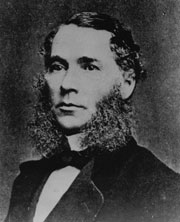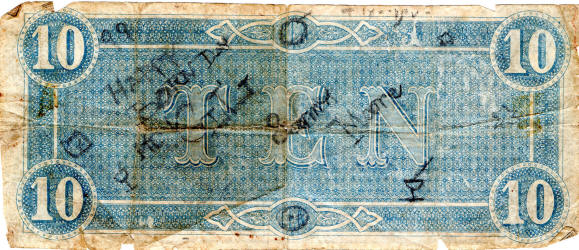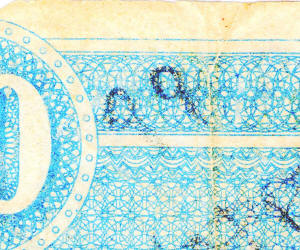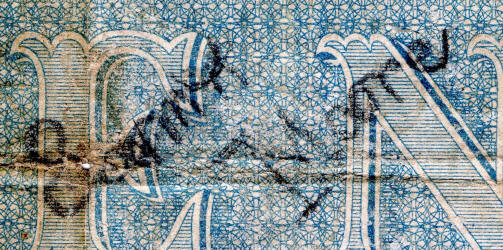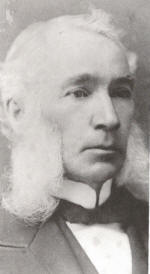Samuel Preston Moore was trained as a military surgeon in the US Army but resigned his commission and was appointed Surgeon-General of the Confederate States Army Medical Department at the beginning of the American Civil War. He reformed the mediocre medical corps by raising recruiting standards and improving treatment protocols and by placing the most capable surgeons in positions of authority. He improved the ambulance corps and directed the construction of many new hospitals for Confederate casualties. He was directly responsible for the barracks hospital design, which is still used today. He established the Confederate States Medical and Surgical Journal and directed a successful effort to develop substitutes for scarce pharmaceuticals from the indigenous flora of the South. He founded the Association of Army and Navy Surgeons of the Confederate States of America. With skill and dedication, Dr. Moore transformed the medical corps into one of the most effective departments of the Confederate military and was responsible for saving thousands of lives on the battlefield.
American journal of surgery. 01/11/1992; 164(4):361-5
______________
Samuel Preston Moore, a native of Charleston, South Carolina graduated from the Medical College of the State of South Carolina in 1834 and quickly became assistant surgeon for the United States Army in 1835. This position required service in several frontier regions of the country, including Missouri, Kansas, Florida, and the Texas-Mexico border. While serving in the Mexican War (1846-48), Moore met the future President of the Confederacy, Jefferson Davis, who was quite impressed with his organizational and disciplinary abilities (Rutkow, Manual of milit. surg., vi). Moore was promoted to surgeon in 1849 and remained in this position through the 1850s. However, like many Southern officers in the United States Army, he was in crisis at the brink of the Civil War. When his home state of South Carolina seceded, he resigned his post in the U.S. army and moved to Arkansas to open a private practice and to avoid fighting against a country he had devoted so much of his life to. However, he began receiving personal requests from Jefferson Davis to join the Confederate army. Davis’ descriptions of the army’s unfortunate military situation and the lack of trained medical men eventually persuaded Moore to become surgeon-general in 1861, a position he would hold for the duration of the war (Rutkow, Manual of milit. surg., vii).
When Moore joined the Confederate army, they were already facing many medical-related difficulties, such as shortages of medicines, supplies, and equipment caused by the Union blockade of Southern ports and a lack of trained surgeons. Moore addressed all of these problems. He introduced a new type of large, one-story pavilion hospital and arranged for their construction throughout the South. He established an effective army hospital and field ambulance corps. Moore is also remembered for his resourcefulness in supplying the army with much-needed drugs by creating laboratories to prepare medications from indigenous Southern plants (Assoc. of the Med. Officers 3; Kelly & Burrage 865). In one issue of the Confederate States medical and surgical Journal (January 1864 – February 1865), a journal Moore started and directed, there is an article by him discussing the medicinal properties of Southern plants and criticizing the American Medical Association for not demanding that the blockade be lifted for medicines (Freemon 98-99). This article, “Indigenous remedies of the South,” is held at the Reynolds Historical Library within a bound volume of the journal from 1864-65.
Moore also instated measures to improve the quality and education of the Confederate army doctors. He set up an examination system that weeded out untrained doctors. If an examinee failed, he could be redeemed by serving as a hospital attendant and later retaking the exam (Freemon 40). In this way doctors who needed improvement were identified and trained. Also, Moore worked to increase the professional and technical knowledge of Confederate doctors by forming a professional organization, the Association of Army and Navy Surgeons of the Confederate States, founding the journal mentioned above, and compiling A manual of military surgery (1863). This manual is a collection of papers by surgeons which provides exact instructions (with drawings) for performing operations. It was intended for use by inexperienced surgeons in the army (Freemon 98).
From: http://www.uab.edu/reynolds/CivilWarMedFigs/Moore.htm
______________
Brig. General
Samuel P. Moore
(CSA), Surgeon
General)
http://en.wikipedia.org/wiki/Samuel_P._Moore
Samuel Preston Moore
(September 16, 1813
– May 31, 1889) was
an American
physician, who
served in the
medical corps of the
United States Army
during the
Mexican–American
War, and later as
the Confederate
Surgeon General
throughout nearly
all of the American
Civil War.
Early life and
career
Samuel P. Moore was
born in 1813 in
Charleston, South
Carolina. He was a
son of Stephen West
Moore, a prominent
banker in Charleston
(originally from
Virginia), and his
wife, Eleanore
Screvan Gilbert. His
brother, Stephen M.
Westmore, also
served in the
Confederacy. Moore
was educated in the
local public schools
of Charleston, and
then attended South
Carolina Medical
College with the
intention of
becoming a
physician. He
graduated in 1834
and relocated to
Little Rock,
Arkansas, to start
his medical
practice.
On March 14, 1835,
Moore entered the
U.S. Army, and was
appointed as an
assistant surgeon.
In this capacity he
serviced in the
American frontier,
including regions of
Missouri, Kansas,
Florida, as well as
along the Texas
border with Mexico.
Moore married Mary
Augusta Brown in
1845.
Moore also served as
a surgeon during the
Mexican–American
War, which lasted
from 1846 to 1848.
He befriended Col.
Jefferson Davis, the
future Confederate
President, who was
greatly impressed
with Moore's
abilities. Following
the war with Mexico,
Moore served in
several U.S. Army
postings, including
a short stint at the
United States
Military Academy at
West Point as a
surgeon. On March
30, 1849, he was
promoted to the rank
of major in the
army's Medical
Corps.
Civil War service
When the American
Civil War began in
1861, Moore was
still a U.S. Army
surgeon. He resigned
his commission on
February 25, and
returned to his
medical practice in
Little Rock,
Arkansas. After the
state of Arkansas
seceded from the
Union, Moore was
approached by
Jefferson Davis to
join the Confederate
cause, who cited
"the army’s
unfortunate military
situation and the
lack of trained
medical men..." to
persuade him. On
March 16 Moore was
assigned to lead the
new Confederate Army
Medical Department
as surgeon general.
He replaced Charles
H. Smith, who had
been the acting
surgeon general.
Moore assumed his
post on July 30; he
would hold this
position until the
end of the war. By
1863 Moore's
headquarters were
the Confederate
capital of Richmond,
Virginia. He also
would set up a
Reserve Surgical
Corps.
Facing shortages in
medicines, supplies,
and equipment due to
the ongoing Union
blockade of Southern
ports, as well as a
shortage of few
trained surgeons,
Moore's job was
difficult. He raised
the recruiting
standards and gave
the most capable
surgeons positions
of authority. Moore
designed the
barracks-hospital
layout, which is
still in use today.
This single level
pavilion-style
hospital was ordered
built throughout the
South. He improved
the field ambulance
corps, and
supplemented the few
available medicines
with drugs made from
the South's
indigenous plants,
which were produced
in laboratories set
up by Moore.
To address the quality of surgeons, Moore organized an examination system to identify untrained doctors. If they failed, the doctor would serve as an attendant in a hospital for a time and retake the test. This system allowed semi-trained surgeons to be further educated, and unusable doctors to be dismissed from service. In 1864 Moore established the Confederate States Medical and Surgical Journal, a manual to instruct the surgeons throughout the army; it included both exact descriptions and drawings of operations. During the war Moore also founded the Association of Army and Navy Surgeons of the Confederate States of America. This organization is believed to be the oldest military medical society in the United States. He also added dentists to the hospitals, the first time in American history its soldiers and sailors had access to this service. By the end of the war in 1865, the Medical Department of the Confederacy had about three thousand men under Moore.
Postbellum.
After the war ended in 1865, Moore resumed his life as a civilian doctor. He began a medical practice in Richmond, where he would spend the rest of his life. From 1877 to 1883 Moore also served on the Richmond School Board. He died in Richmond in May 1889, and was buried in the city's Hollywood Cemetery.
Legacy
While Moore's
abilities and
effectiveness have
been disputed,
Jefferson Davis
approved of his
performance.
Military historian
Bruce Allardice
describes his
contemporary
judgments as
positive, citing
praises such as "his
great work as an
organizer, his
remarkable executive
ability" and his
"great brusqueness
of manner and his
sternness as a
disciplinarian."
Military historian
David J. Eicher
disagrees, saying
"Surg. Gen. William
A. Hammond (U.S.)
and Samuel P. Moore
(C.S.) were
relatively
ineffective as
administrators..."
Another summary also
praises Moore's
results, stating:
With skill and
dedication, Dr.
Moore transformed
the medical corps
into one of the most
effective
departments of the
Confederate military
and was responsible
for saving thousands
of lives on the
battlefield.
Moore's rank in the
Confederate Army has
also been disputed.
When the Confederate
Army's Medical
Department was
organized on
February 26, 1861,
the legislation
stated the surgeon
general would be a
colonel. However,
Military historian
Bruce Allardice
considers Moore to
be a brigadier
general, as did
Confederate Veteran
magazine. The
Confederate
Congress's Act of
February 27, 1861,
stipulated that the
post would be a
staff officer only.
Moore is also listed
as an
"unsubstantiated"
brigadier general of
the South Carolina
militia, appointed
in 1865. Subsequent
legislation to make
the surgeon general
a brigadier was
proposed but never
became law.
______________
https://www.scencyclopedia.org/sce/entries/moore-samuel-preston/
Surgeon general of
the Confederacy.
Born in Charleston
on September 16,
1813, Moore was the
sixth of nine
children born to
Stephen West Moore
and Eleanor Screven
Gilbert. Following
his graduation from
the Medical College
of South Carolina,
Moore was
commissioned an
assistant surgeon in
the U.S. Army in
1835. He spent the
next twenty-five
years at a variety
of western and
southern military
posts. During the
Mexican War, Moore’s
administration of
the American General
Hospital at Carmago
impressed a young
Jefferson Davis, the
future president of
the Confederacy. By
1860 Moore was
serving as medical
purveyor at New
Orleans.
In 1861 Moore resigned from the U.S. Army and sought a commission in the Confederate military. Jefferson Davis selected Moore as acting surgeon general of the Confederacy. Moore faced the daunting task of creating Southern medical services from scratch. Known as a stern disciplinarian, he was able to field a medical corps of approximately three thousand officers. This was a major feat considering that only twenty-four officers had served in the U.S. Medical Corps and only twenty-seven of his physicians had surgical experience. One of the more imaginative ways Moore achieved this was to establish a scholarship program so that young Southerners could attend Richmond Medical College. Not only did he have to recruit personnel, he also had to create a system of laboratories to supply medical units. He supplied Confederate women with poppy seeds to cultivate so that the South had a homegrown supply of painkillers. Similarly, he purchased four distilleries to provide six hundred gallons of medical alcohol each day and promoted the appropriation of Union stocks. When a lack of Southern manufacturing facilities led to a shortage of medical equipment, Moore located and acquired instruments from retired or deceased doctors.
Moore promoted research throughout the war. He ordered the surgeon Joseph Jones to search out the causes of unusual infections and diseases affecting soldiers. In 1863 he organized the Association of Army and Navy Surgeons of the Confederate States to gather and disseminate information. This group would outlast the war and merge with the Association of Military Surgeons of the United States in 1914. He also instituted a monthly professional periodical, The Confederate States Medical and Surgical Journal, to better educate those under his command.
Moore oversaw each hospital in the South through personal and military correspondence and established large general hospitals, such as Chimborazo in Richmond. His greatest accomplishment might have been the vaccination of the entire Southern army against smallpox in only six weeks, a controversial decision in 1862. In 1913 the Southern Medical Journal stated, “Looking back upon what he achieved, at what he created absolutely out of nothing, the marvel grows until it impresses one today as an impossibility.”
After taking the
oath of amnesty in
Richmond on June 22,
1865, Moore retired
from the medical
practice and focused
on managing his
financial holdings.
He died in Richmond
on May 31, 1889,
after a violent
coughing attack. He
was buried in
Hollywood Cemetery,
Richmond.
